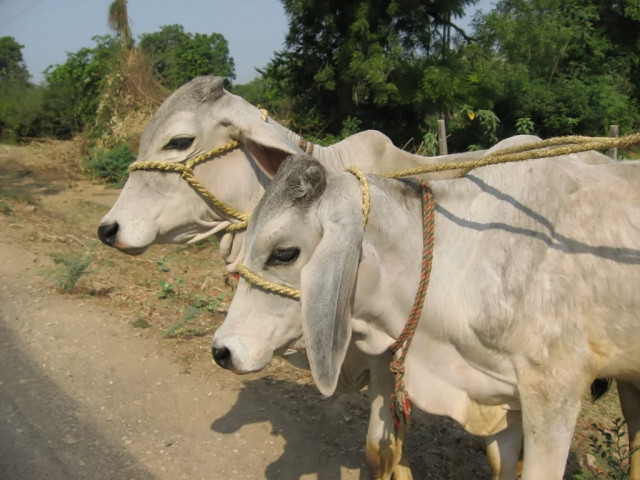Covid-19 lockdown threatens livestock in Thar
Residents barred from getting water, fodder for cattle, their main source of livelihood, from other districts

PHOTO: FILE
The crippling restrictions have not only stopped the traditional annual migration of the desert's dwellers, or Tharis, to adjoining districts in search of water and fodder for the livestock - their main source of livelihood, which accounts for 80% of the local economy - but has also barred the transportation of fodder from nearby districts.
From April to June, the three driest months in the region, thousands of Tharis migrate to the adjoining districts of Mirpurkhas, Badin and Sanghar, where they not only find water and fodder for their cattle but also temporary jobs as harvesters on farmlands.
‘University of Animal Sciences to be set up in Bahawalpur’
The desert covers a region of 200,000 square kilometers (77,000 square miles), has a population of 1.5 million and is ranked by the World Food Program as the most food insecure region in the country. Its annual rainfall is 250 millimeters (10 inches).
While the Tharis have been able to struggle through previous droughts, each year makes the situation more desperate, and now, many of their traditional go-to sources of water have gone dry. "At present, overall conditions are tough due to the ongoing lockdown.
But the situation concerning the livestock is worse," Nashad Samoon, a resident of a remote village in Mithi, told said.
The administration, he said, was not allowing the traditional migrants to move to irrigated districts, whereas the unavailability of transport has led to an acute shortage of fodder in addition to water scarcity. Many of those who attempted to travel to nearby districts were forced to return halfway by security forces, he added.
"We have been left with no other choice but to ration fodder for our cattle," Samoon said. "There might be alternative sources of income in other parts of the country, but here, for us, there is no alternative source besides livestock.
Congo surveillance camps set up at city gates
If this source of income is wiped out, everything will be destroyed for us," he added.
Khatau Jani, a local journalist, endorsed Samoon's view, arguing that a lingering drought coupled with untimely rains and a recent onslaught by locusts in the region had led to a severe shortage of water and fodder for the livestock.
"Thar is one of Pakistan's poorest regions, where 95% of the population lives in remote villages with only a single source of income," he said. "No other area has been affected by this lockdown more than Thar."
Less breeding
Many Tharis trudged through the hot sand and roads to get to adjoining districts days before the lockdown was imposed, but thousands are still waiting for the restrictions to ease, according to Samoon.
"Even those who managed to move are facing troubles. Some have been forced to return while others are still stranded at different locations," he said. Ali Akbar Rahimoo, head of local non-governmental organisation, Aware, which deals with water and livestock issues, fears that the shortage of water and fodder could affect the breeding of animals.
Promoting livestock sector: Efforts needed to increase per animal milk productivity
"Shortages of fodder and water will have a cascading effect on the breeding of cattle, which will eventually hit the region's already weak economy," Rahimoo said. Also, the closure of several cattle markets in Thar and nearby districts for over a month had added to the economic hardship of the local residents, he said.
"However, wheat harvesting is still continuing in nearby districts. They area residents can still find jobs for themselves and fodder for their cattle at the farmlands if the lockdown restrictions for them are eased immediately," he stressed. "Livestock is everything for Tharis. It's a source of income, nutrition and property. Immediate actions need to be taken to save that."
Published in The Express Tribune, April 29th, 2020.



















COMMENTS
Comments are moderated and generally will be posted if they are on-topic and not abusive.
For more information, please see our Comments FAQ